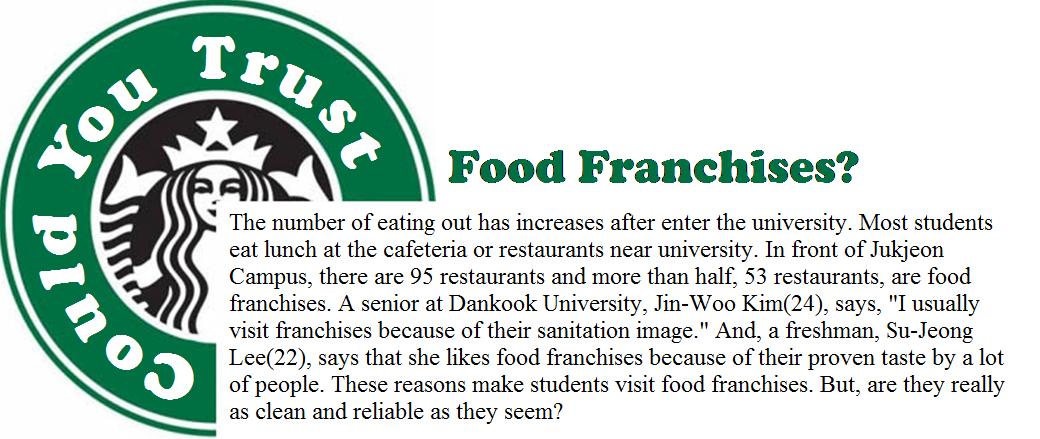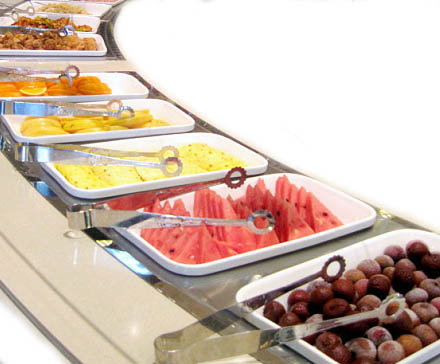 |
||
1. Is it clean?
 |
||
Generally, most franchise companies regularly send their inspectors to check out the store's cleanliness and services provided by local branches. But as we learn through interviews, exceptions always exist.
2. Are the ingredients safe?
We often eat cheaper pizzas. On a KBS program, they inspected the pizza cheese from 12 pizza enterprises. The results showed that 5 out of 12 pizza enterprises used imitation cheese. These pizzas were made with the chemical reactions which were not natural effects. Those pizzas are not good to your health. The ingredients in ice creams also have a lot of problems. It has been found that 4 franchises, including ‘B’ company, used tar as its pigment. The red 40 pigment can be used in ice cream. However, a 2007 British study showed that it increased activities in children.
You need to doubt food-franchises that sell foods at low price compared to other franchises. They are reducing the unit values of their products by using stale, imported and fake ingredients. Some of them add preservatives and sometimes artificial coloring to their foods.
3. Is it the right price?
We analyzed the prices of fried chickens which have recently been greatly fluctuating. Let’s take the case of ‘B’ chicken company. The cost of production takes 18% of the whole chicken price and advertising expenses takes 19%. It is greater that production cost. Of course, it is more favorable to promote the product through advertising than to reduce price for an increase in sales. Therefore, the sellers are willing to pay advertising expenses. We confirmed that brand premium takes 7%, management call centre expenses takes 9% and the VAT takes 10% in the whole products price. In an interview with ‘B’ ice cream franchise, they stated that products are subjected to a tariff problems when it imported to Korea. So the price includes tax. It is mandatory to buy materials from the head office, and the head office gets a fairly good profit from selling ingredients to their branches. Moreover, each supplier demands distribution costs. This process makes higher costs and it is passed on to the customer.
The price of franchise food consists of advertising expenses, brand premium, ingredients distribution costs, and more. Therefore, consumers pay unreasonably high prices for the food when compared to cooking at home and non-franchise foods.
 |
||
People have various ideas about food-franchises. Some people say that they go to food-franchises because of sanitation of the stores and taste of foods. But there are some who have negative views because of dirty facilities and bad ingredients which the media have pointed out. Many franchises always keep their stores clean and do their utmost to satisfy their customers. Nevertheless, there are still negative factors. That is that some franchises cook with stale ingredient and toxic substance. Another factor is the high prices which includes advertisement and brand premium. Would you visit Food-franchises? It’s your choice.
In-Yong Jun, So-Yeon Bang dkherald@gmail.com

![[Campus Magnifier] Let's Surf the Library!](/news/photo/202404/12496_1765_4143.jpg) [Campus Magnifier] Let's Surf the Library!
[Campus Magnifier] Let's Surf the Library!
![[Campus Magnifier] Let's Surf the Library!](/news/thumbnail/202404/12496_1765_4143_v150.jpg)





